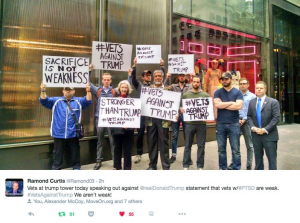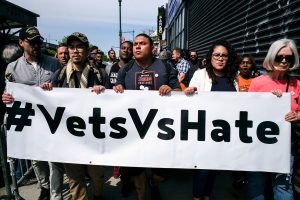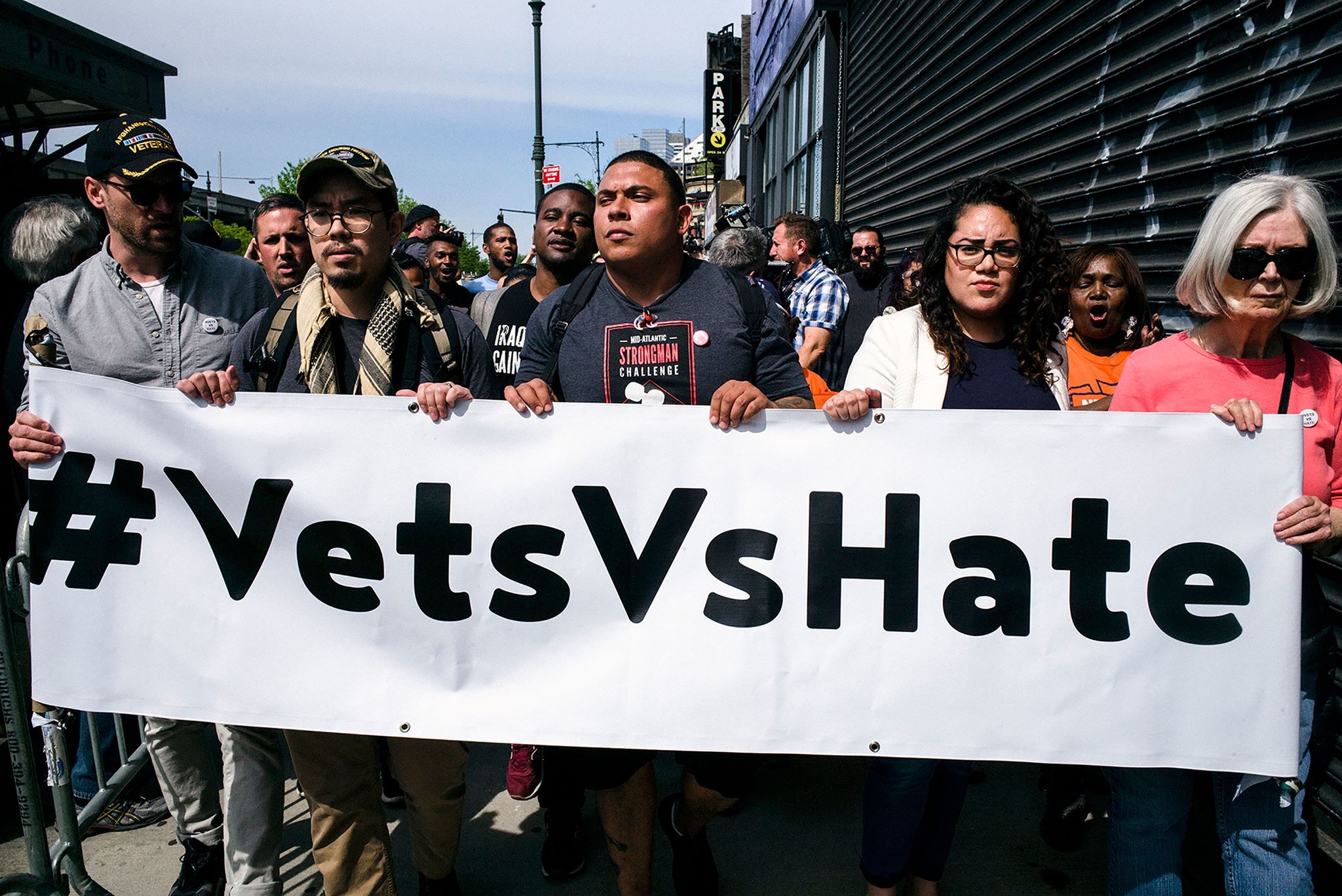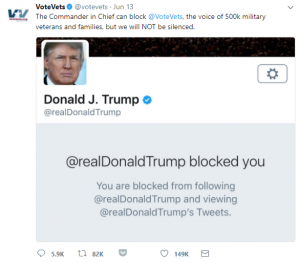by Rena Guay
Since election day, an anti-Trump movement has arisen and grown, as the president’s unstable, unconstitutional, racist, and simply bizarre pronouncements and policy-by-Tweet have jolted Americans into action to defend minorities, the sick or disabled and even democracy itself. Collectively, this movement is known as the Resistance, but is made up of both old and new groups loosely allied in opposition to Trump and company.
It can reasonably be argued that it was veterans who started the Trump resistance, and it happened well before Nov. 8, 2016, the night election results stunned many Americans with the most unpopular candidate in presidential history winning the electoral college, and thus the White House.
It was vets who dogged Trump throughout his campaign during 2015 and 2016, and who, unlike many Americans, did not discount the possibility he might win, and did not ignore that his statements and ideas were deeply unamerican and detrimental to the political process and civic stability. Vets making such statements at Trump rallies were summarily removed, along with the non-vet protesters, in many cases right in front of the cameras of the press. In those cases, service to country was NOT greeted with unquestioning gratitude and respect – they got the boot and the crowd’s loud derision like every other protester.

Using the #VetsAgainstTrump hashtag, vets protest outside Trump Tower in New York City during the presidential campaign in 2016.
Post election, veteran’s groups only intensified their activities, networking with the groups such as Indivisible that rose out of the election aftermath, but remaining in a key position within the larger movement. Vets groups have the ability to speak authoritatively about Trump’s relationship with the military – five deferments during the Vietnam era, support for the Iraq War and other military foibles – and his underlying antagonism, demonstrated through his policy agenda, to helping those without power or large bank accounts and to fulfilling the promises made to servicemembers about caring for them when their service was completed.
Once Trump was inaugurated and Republican majorities were ensconced in Congress – and soon at the Supreme Court when Neil Gorsuch was placed in the seat stolen from Obama nominee Merrick Garland — even the very existence of the Veterans Administration as we know it faced threats from Republican- and Trump-supported privatization efforts. In fighting this, vets were joined by many of their brothers and sisters who might never have been involved in activism before, as well as non-vet allies who placed the threats to vets care within a broader framework of their resistance.
Back in March, Maggie Martin, Co-Director of Iraq Veterans Against the War (now renamed About Face: Veterans Against The War) said this about the group’s work in the Trump era:
Veteran activism is on an uptick, from those who got politicized or reactivated around support for Bernie Sanders to new veterans groups emerging from the veterans mobilization to Standing Rock. We want to be a support to these newly engaged folks as well as trying to guide those who aren’t already there towards centering those most impacted and viewing the emerging people’s movement through an intersectional lens. We expect to see more people resisting from within the military and other government institutions, considering orders that may be illegal and/or unconstitutional, [and] in order to prepare, we are assessing what resources and support are available for resistors as well as what we can offer as an organization.
Below I detail some of the political work of four veteran-focused groups since the installation of the Trump administration: Common Defense (formerly #VetsVsHate), Veterans for Peace, About Face (formerly Iraq Veterans Against the War) and Vote Vets. What follows is by no means comprehensive, but should serve as a good representative overview of the anti-Trump organizing being led by vets.
Common Defense
Common Defense is the new kid on the block among vet activist groups, but its strong presence during Trump’s campaign, when it was organizing under the hashtags #VetsAgainstTrump and #VetsVsHate, gave it a solid start after the election when the resistance movement mushroomed in response. Since then, even before rebranding as a PAC, it networked with non-vet resistance groups and was visible at the Women’s March in January, and in subsequent anti-Trump actions, primarily in the NYC-DC area.

Vets protest in New York City near the USS Intrepid during a Trump speech on May 4, 2017. The event was organized by Common Defense and other groups.
Its mission states that it is “a diverse, grassroots organization of U.S. veterans and military family members who are fighting to preserve the core values we swore to uphold and defend. Together we vow to protect our communities from hate and violence, to serve on the front lines for social, economic, and environmental justice, and to champion a truly equitable and representative democracy.”
Current campaigns being promoted by Common Defense include support for preserving (and strengthening) the Affordable Care Act and DACA (cancellation would impact immigrant servicemembers and veterans), as well as a petition to investigate Trump’s ties to Russia.
On August 16, following the Nazi demonstration in Charlottesville and the death of one of the counter-protesters, @Vets_Vs_Trump was blocked by @realDonaldTrump, the president’s personal Twitter account. The group reported that “As Veterans, we told Donald Trump that the way to honor Heather Heyer is to unconditionally oppose white supremacy & hate. He blocked us.”
 They joined a long list of other individuals and groups blocked by @RealDonaldTrump for daring to question or criticize him. Screenshots of the barred status are posted proudly as a badge of honor, and serve only to increase the stature of the blocked account holder among the Resistance.
They joined a long list of other individuals and groups blocked by @RealDonaldTrump for daring to question or criticize him. Screenshots of the barred status are posted proudly as a badge of honor, and serve only to increase the stature of the blocked account holder among the Resistance.
Facebook: https://www.facebook.com/vetsvshate/
Twitter: https://twitter.com/Vets_Vs_Trump
Web: http://www.commondefensepac.org/
Veterans for Peace
The 50-year-plus record of Veterans for Peace in opposing tyranny, militarism and injustice is well known to regular On Watch readers. Unsurprisingly, their response to Trump and his administration’s agenda has been as we would expect: continuing that record and welcoming those new to the effort they know so well. They were fighting the long wars in the Middle East and Afghanistan, the always expanding military budget, drone strikes and international weapons deals “before it was cool” and Trump didn’t break their stride.
On Nov. 9, just one day after the election, they distributed a press release with the title “Veterans Challenging Islamophobia Respond to Election.” The statement included this:
Throughout this past year we have called upon Mr. Trump to abandon his divisive anti-Muslim rhetoric. He has done more to legitimize bigotry and create division than arguably any one person has done in the United States in decades.
As people of conscience, we must step up our support for marginalized, discriminated, and disenfranchised communities.
Subsequent releases addressed The Women’s March, and plans for military build-up and increased police militarization.
On Memorial Day, VfP helped organize a massive march to DC. In conjunction with this event, VfP member Matt Hoh, a former Marine Captain (two tours in Iraq) and State Department official who resigned in protest from his post in Afghanistan over U.S. strategic policy and goals, said: “Donald Trump and company are hell-bent on destroying what’s left of our democracy, the environment, and whatever chance we have of world peace. Veterans will not be silent while he does it.”
Veterans For Peace President Barry Ladendorf sent a letter to President Trump requesting a meeting to discuss military policy and to refocus spending on peace and issues at home. The letter said, in part:
We speak for the majority of U.S. citizens, who believe your policies are taking innocent lives and endangering more of our young soldiers, who have already given so much in the needless wars in Iraq and Afghanistan. Now we have sent more Marines into Syria. Your policies are also causing suffering and despair among immigrants, Muslims, communities of color, women, Native Americans, and LGBTQ communities, and if implemented, these policies will further destroy the environment. Ultimately, they make all of us considerably less secure.
To date there has been no response to the request from the White House.
On Sept. 8, VfP was among more than 20 organizations signing a statement opposing the expansion of the federal government’s Countering Violent Extremism (CVE) program. A press release explained that “The joint statement is in response to growing congressional calls to expand CVE to include white supremacist groups — as such a move would only serve to legitimate a program that actively surveils, profiles, censors, and divides the American Muslim community.”
In August, VfP promoted a “Freeze for A Freeze in Korea” direct action and advocacy campaign in response to planned joint military drills by the US and South Korea, which it called “highly provocative and threatening rehearsals for war involving tens of thousands of soldiers simulating surgical strikes on North Korea.” The call to action explained:
Pyongyang views this as threatening and justification for pursuing its nuclear weapons and missile program.
A proposal on the table to avert war and start talks is “freeze for freeze” in which North Korea suspends its nuclear and missile testing in exchange for halting or scaling back large-scale US-S.Korea joint war drills. A growing number of American officials are calling for this “freeze for freeze,” which has also been proposed by North Korea, China and Russia.
Veterans For Peace is joining with multiple organizations under the Korea Peace Network for A Week of Actions!
As Trump and Kim Jong-un play at brinksmanship, and as this situation continues to ignite, more such activity on this issue is likely.
Facebook: https://www.facebook.com/veteransforpeace
Twitter: https://twitter.com/VFPNational
Web: veteransforpeace.org
Iraq Veterans Against the War/ About Face: Veterans Against the War
 IVAW was founded shortly after the beginning of the Iraq War and is an organization that the MLTF community knows well, having cooperated on GI rights projects and veteran support activities. The group recently rebranded, changing their name to About Face: Veterans Against the War. The change was announced in August as they prepared to hold their annual convention.
IVAW was founded shortly after the beginning of the Iraq War and is an organization that the MLTF community knows well, having cooperated on GI rights projects and veteran support activities. The group recently rebranded, changing their name to About Face: Veterans Against the War. The change was announced in August as they prepared to hold their annual convention.
Continuing the legacy of our organization, founded in 2004, this was our first convention since deciding to change the name of our organization from Iraq Veterans Against the War to About Face: Veterans Against the War.
[we were founded to] amplify the voices of active duty service people and veterans who were against an unjust war and under various pressures to remain silent. For over a decade, IVAW has lead the movement of veterans and GIs working to end the US military’s occupation of Iraq.During that time, we built a grassroots base of over 3,000 veterans and active duty personnel who have served in the United States military since September 11, 2001, and who have since done an About Face: turning against the wars at home and abroad.
We want to share with you – our movement family – who we are, what we stand for, and where we are going. We want to honor our history, live into our future, and uplift our members and our comrades who are organizing against militarism.
This year’s convention was especially exciting as we roll out our new brand we also begin a new era of outreach and organizing at the intersections of US Militarism.
Our ranks are growing and we are ready for what this moment calls us to do.
Earlier in the year, Co-Director Maggie Martin shared about a nonviolent direct action training the group held at Highlander Center in May and explained that “we are developing a community defense program to think about how vulnerable people and people’s movements are facing different and heightened threats in the Trump era.”
She expanded on the way the group thinks about its mission:
We want to connect with organizations that are working on issues at the intersections of militarism, such as how militarism is expanding in our communities in areas like policing and schools, or folks working on environmental issues with an analysis of how militarism props up extraction in places overseas as well as places like Standing Rock.
A major project for the group since 2016 has been #DropTheMIC, which operates within an intersectionality framework, as mentioned in Maggie’s quote at the beginning of this article.
Iraq Veterans Against the War has initiated conversations across the country through our Drop the MIC campaign that have focused on the root cause that underlines both the occupations by U.S. military abroad and the violence perpetrated in our communities by police right here at home: militarism. Drop the MIC aims to make visible the many ways, both obvious and hidden, that the military industrial complex intersects our lives and our ability to care for ourselves and our communities.
The Movement for Black Lives policy platform outlines the need and the strategy to divest in the structures that are robbing black people of their lives and invest in what communities need to thrive. “While this platform is focused on domestic policies, we know that patriarchy, exploitative capitalism, militarism, and white supremacy know no borders.”
Let’s talk together about the real effects of militarism on our local communities, our society and abroad.
IVAW’s Facebook page is one of the best aggregators of war, antiwar and GI Rights news on the site and in its choice of external content to feature shows a serious commitment to keeping its community informed and on the cutting edge of anti-militarism work, whoever is president.
Facebook: https://www.facebook.com/IraqVeteransAgainstTheWar/
Twitter: @VetsAboutFace
Web: http://www.ivaw.org/
Vote Vets
Vote Vets is another veterans organization that has the distinct honor of being blocked on Twitter by the president’s personal account.
The group describes its mission:
Started in 2006 and backed by more than 500,000 veterans, military family members and their supporters, the mission of VoteVets.org is to use public issue campaigns to give a voice to veterans on matters of national security, veterans’ care, and every day issues that affect the lives of those who served, and their families.
Considerably more mainstream than the other organization in this list – one of their projects is to get vets elected to political office – nonetheless, Vote Vets has joined the fray in publicly opposing many of Trumps policies and proposals, and generally has been very vocal about calling out his support for white supremacy and unconstitutional discrimination against religious groups and Latino people, especially as those policies impact servicemembers and veterans.
Well funded relative to the others, Vote Vets produces professional videos and graphics that promote their issues. Spokespeople from the organization are not completely blacklisted from corporate media, though they are not as frequent a voice on those platforms as one might hope.
They did get such a voice in 2016 after Trump trashed the family of Cpt. Humayun Khan during the Democratic convention, appearing on television and being quoted in quite a few newspaper articles.
The election did not squelch their vigor in opposing the racist statements and policies flowing from the Trump administration. They actively oppose the Trans ban and support protecting Dreamers through DACA and similar legislation. Using their solid funding wisely, on September 14 they launched a nearly $400,000 ad blitz against privatization of the VA
A new ad blitz launching today aims to stop efforts aimed at privatizing the Department of Veterans Affairs, in their tracks. The ads, sponsored by VoteVets Action Fund, will be airing nationally and on the internet, with particular attention paid to areas with lawmakers who will be influential in deciding the future of veterans health care. The total buy for the ads is $390,000, with $320,000 on television and $70,000 on the internet. The ads will run, beginning today, for one week.
While the ad is airing nationally, particular attention will be paid to people living in Alaska, Florida, Kansas, Louisiana, Maine, Minnesota, Montana, Nevada, Ohio, South Dakota, Tennessee, Texas and West Virginia.
The first ad, airing on television, features Patrick Cleveland, a Vietnam Veteran.
In the ad, Cleveland explains, “In Vietnam, I counted on my fellow soldiers to help me make it out alive. Here at home, the VA has done the same. They caught my lung cancer early. At another hospital, they would have never known that was connected to Agent Orange. But some folks in DC want to privatize my VA. The VA is better prepared to serve veterans because they know what we veterans have been through. The VA saved my life. Now it’s up to us to save the VA.”
That ad can be viewed, here: https://youtu.be/idKVyrTEuSQ
The second ad, which will appear online, to target a younger audience, features Victor Phillipi, an Iraq War Veteran.
In the ad, Victor says, “When I was a Platoon Leader in Iraq, we had to lean on one another to get through. My PTSD really got worse around some anniversary dates of combat operations I was involved in. That’s when I first went to the VA for treatment. They helped me tremendously through a little bit of some medication and being around other veterans and talking. But some folks in Washington DC are talking about privatizing my VA… And I’m not sure I’d get health care I trust. The way I see it: the VA saved my life. Now it’s up to us to save the VA.”
That ad can be viewed, here: https://youtu.be/_JPi0oDW_mo
Both ads end with the same call to action: “Tell Congress, don’t let Trump privatize my VA. 202-225-3121.”
As proclaimed in a Tweet pinned to the top of their page “The Commander in Chief can block @VoteVets, the voice of 500k military veterans and families, but we will NOT be silenced.”
Facebook: http://www.votevets.org/facebook
Twitter: http://www.votevets.org/twitter
When the Right turns Reich
It would be unfair to overlook the much broader population of vets that, while not involved in the same way in opposing Trump per se, nonetheless have stepped forward in condemning the most flagrant evil and chaos he has wrought. This is particularly true as it has become clearer over time that white supremacy and fascism are strong elements of Trump’s agenda and the backbone of his support.
After the Charlottesville “Unite the Right” rally in August, where a counter-protester was killed when a car plowed into the crowd, The Military Times and other media reported that “Vets groups decry hatred, racism in wake of Charlottesville violence.”
Veterans groups on Monday forcefully rejected the views of neo-Nazi and white supremacist groups following reports that the Charlottesville extremist who drove his car into a crowd of counter-protesters briefly served in the military.
“The disgusting displays of hatred and bigotry on display in Charlottesville dishonor all veterans who fought and died to stamp out fascism,” American Legion National Commander Charles Schmidt said in a statement two days after the violent protests in Virginia.
“Americans fought fascism and crushed the Nazis in WWII, and anyone who waves a Nazi flag on our soil is, by very definition, anti-American.”
While more traditional veterans groups like the American Legion, whose members are older and more conservative, tend statistically to be part of Trump’s base – or were on election day — we may be seeing that support fading with the higher visibility of the neo-Nazi right. Or perhaps they are having to be more circumspect and discerning about their support, and write sternly worded statements when things get too ugly to ignore. That may need to be seen as some kind of progress too.
But, historically and currently, it’s younger people who protest and demand change, and that’s the case with these veterans groups I have profiled, which, excepting Veterans for Peace, are made up primarily of those who served post 9/11. And VfP started when its members were about the same age as the members of the newer groups now – they just kept going because the mission never ended, it just changes its face every few years.
The Resistance is winning
In Star Trek: Enterprise, the mind-controlling Borg warned the soon-to-be victims of absorption that “resistance is futile.” But in the Age of Trump, resistance is clearly finding considerable success, both in gaining strength and numbers, and in stopping or mitigating some of the worst of Trump’s policy enactments or reversals of Obama policies. Vets are a vocal and visible part of this movement, and bring the experience of their past organizing through groups like Veterans for Peace and About Face/Iraq Veterans Against the War, while taking on new challenges.
They are sought out and appreciated for that experience, and for the moral clarity that their voices provide in the national conversation about justice, diversity and inclusion that Donald Trump’s election has elevated to a roar.
Rena Guay is MLTF’s web administrator and IT consultant, and a longtime peace and justice organizer. She currently is living in Oklahoma.




